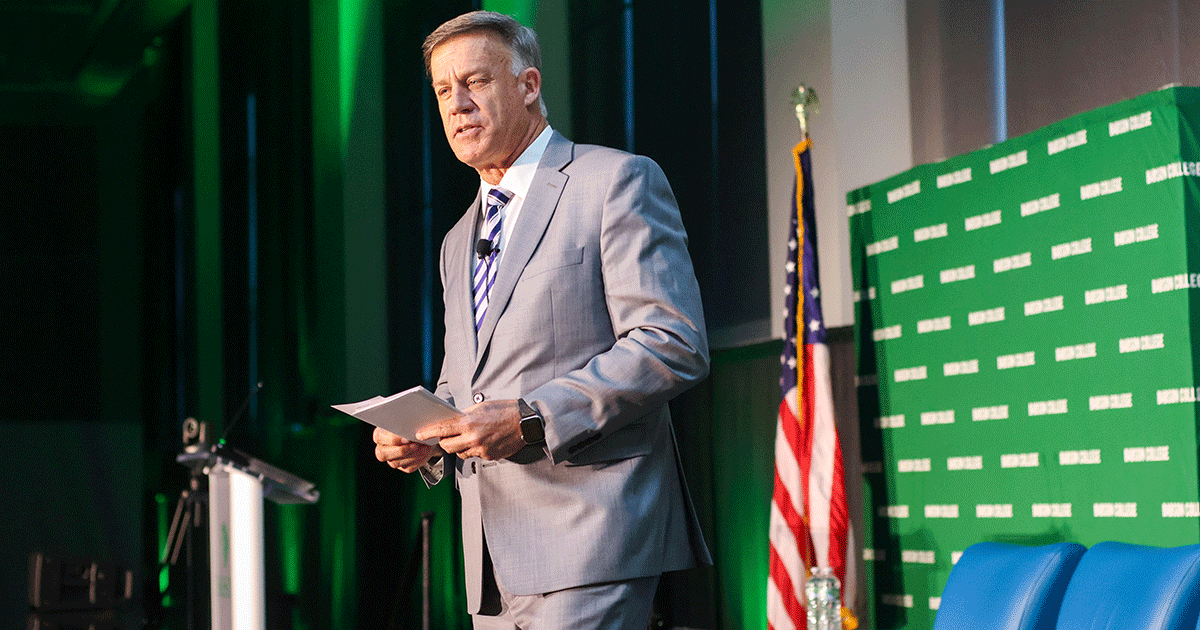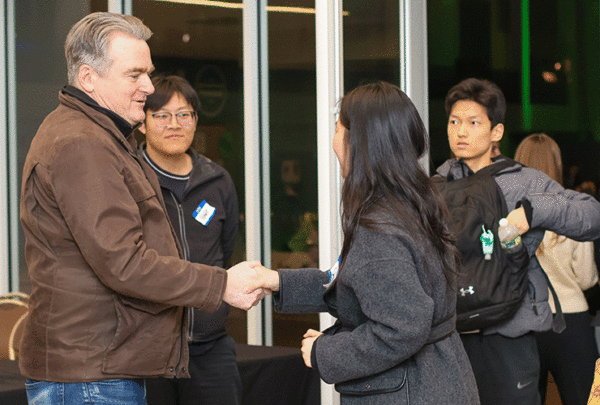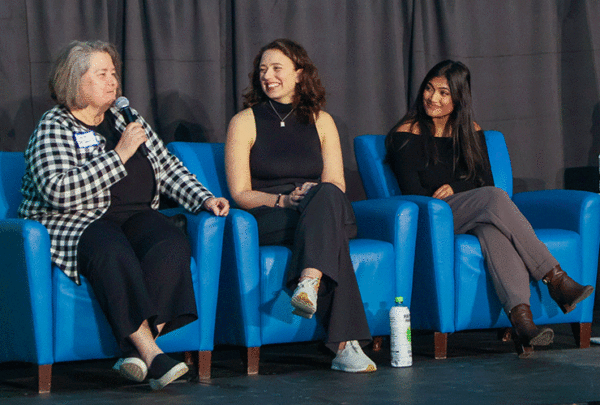Six Leadership Lessons from the Young Entrepreneurs Conference at Babson

Standing on stage at Babson, Sean Buck was speaking of grit, resiliency, and life’s challenges when his talk took a personal and poignant turn.
A retired vice admiral who served more than 40 years in the Navy, Buck spoke at last month’s Young Entrepreneurs Conference, a longtime tradition organized by the students of Babson’s eTower. As he neared the end of his talk, Buck spoke of the tough times one faces in life and mentioned his adult son.
Just 12 days before, his son had died in an accident. “I’ve had probably the most horrific thing ever that could happen to a father,” he said.
Watching in the audience, Dan Berlin ’26 was moved. “His message was clear: Life will inevitably throw us curveballs, and our resilience is tested by how we choose to face these challenges,” said Berlin, the president of eTower, a community of student entrepreneurs at Babson. “His story, perspective, and demonstrated leadership resonated deeply with me.”
Several hundred students attended the annual conference, which was held in the Len Green Recreation and Athletics Complex and offered attendees the chance to network and hear from entrepreneurial leaders. Three eTower residents—Berlin, Ryan Lytle ’24, and Kirk McKinney ’26—took time to reflect on the conference and share the leadership lessons they learned. Here are their six takeaways.
1. Building Loyalty

Buck talked of leading men at sea and how, at times, situations arose that necessitated he stay up for long stretches, as many as 27 hours in row. Despite such grueling work, Buck said his men remained by his side during the entirety of those long days and nights.
To build such steadfast loyalty, Buck relied on three principles: have faith in yourself and your team members; explain to them why their work matters at every step; and never ask the team to do something you wouldn’t do yourself.
Berlin is eager to apply Buck’s principles as he works on his startup, Performance Backed, a provider of sports nutrition products. “His insights reinforced the importance of fostering unwavering loyalty in myself and my team,” Berlin says, “a crucial factor in overcoming challenging situations.”
2. Lead with Intention
The importance of letting employees know the why behind their work was one of Buck’s principles that spoke to Lytle. In particular, a quote that stuck with Lytle was when Buck said, “When dealing out tasks, ensure there is intent.”
Lytle is set to become the vice president of creative at Build You Marketing, a brand growth agency started by Jake Ross ’24, and he hopes to utilize Buck’s leadership philosophy.
“This approach will be crucial, especially since I’ll be helping manage a remote team, where physical disconnection can sometimes translate to a lack of engagement,” Lytle says. “Creating a sense of purpose and connection to projects will be a priority of mine.”
3. Family and Work
Buck spoke of the relation between family and work, of how being close and devoted to family can make one a better leader. That’s a message that resonated with McKinney, who started a junk removal business, Junk Teens, with his brother.
“Being a good family person allows you to learn empathy and communication, which you can bring into the workplace,” McKinney says.
4. Mental Fitness

To be a strong military leader for more than 40 years, Buck needed to be mentally fit. That meant being able to make quick decisions and stay clear-headed under pressure.
As he aspires to scale Performance Backed, Berlin knows he will face stress and tough decisions. “Buck reminded me that building my mental resilience is as critical as maintaining my physical health,” Berlin said. “I will follow the steps that he outlined, like pushing myself into uncomfortable situations and actively practicing mindfulness, to enhance my mental fitness.”
5. Be Mindful of Meetings
In addition to Buck, another speaker at the Young Entrepreneurs Conference was Paul English, the co-founder of Kayak. English railed against that common scourge of many a leader: meetings.
Meetings can be time wasters, he said, especially if they have too many attendees. Just a single attendee zoning out or going on their phone can drag a meeting down. “English suggested focusing on making meetings short, with clear goals such as making decisions fast or strengthening team culture,” McKinney says.
6. Assembling a Team
English also had advice about how to build a team. In job interviews, he said, go beyond surface-level chitchat to ascertain job candidates’ problem-solving abilities and how they will fit with your culture. Ask them thought-provoking questions, such as what went right and wrong with a team project or what would they improve on an app they use frequently.
Lytle is preparing to lead numerous creative projects at Build You Marketing. He knows he’ll need a good team working with him. “It’s crucial to understand a candidate’s thought process to assemble a team that is both innovative and cohesive,” he said.
Posted in Entrepreneurial Leadership, Insights
